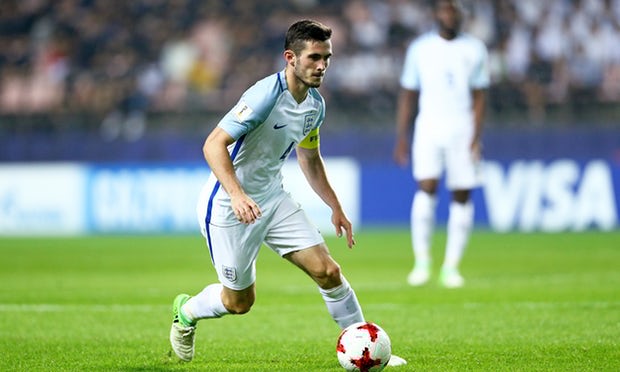London – It rains on a ticker-tape parade to remind England’s Under-20s that it will be easier to conquer the world than the obstacles that litter their path to regular Premier League football but they can take comfort from the roots of their triumph in South Korea. Sunday’s World Cup success, England’s best return on the international stage since 1966, repaid a willingness of the Football Association and Premier League to act on concerns over youth development in this country. A change in attitude at Premier League clubs could bring further reward.
Lewis Cook, the England captain, had only just hoisted aloft the Under‑20s World Cup following victory against Venezuela in Suwon when the debate began over the future prospects for Paul Simpson’s players – with a tone of inevitable, understandable foreboding.
The 13 players who featured in the final for England ran up a combined total of 1,094 minutes in the Premier League last season, roughly the equivalent of 12 matches, with Cook having the most, with 431 minutes in the Bournemouth midfield. The match-winner Dominic Calvert‑Lewin, only the third Englishman to score in a World Cup final, comes next with 346 minutes for Everton followed by his club-mate Ademola Lookman on 287. The time then slips away to Josh Onomah’s 17 minutes for Tottenham Hotspur while seven of those who played on Sunday did not play a single minute of Premier League football last season.
The suspicion that the final could have been as good as it gets for some in the England team deepened when the goalkeeper Freddie Woodman, fresh from making a fine and crucial late penalty save, admitted that his future at Newcastle United was uncertain having spent last season on loan at Kilmarnock in the Scottish Premiership.
Those playing statistics are indicative of a league where financial pressures and incentives do not encourage patient development and risks on young talent; and of a competition where some owners are more concerned with grabbing additional money from the broadcasting revenue pool than the international fortunes of what to many is a foreign land. But the efforts to clear the pathway for homegrown talent in the Premier League cannot be dismissed with England the world champions at under-20 level, even if the long-term benefits are yet to be seen at senior level.
For the FA victory in South Korea rewards its decision to bring uniformity to England coaching at all age levels, to seek greater cooperation with Premier League coaches and to improve team cohesion via their St George’s Park base. Six of Sunday’s squad featured in England’s European Championship success at under-17 level in 2014 with four – the Golden Ball winner Dominic Solanke, Jonjoe Kenny, Woodman and Josh Onomah – starting against Venezuela. More recent and arguably more important changes have taken place within the Premier League as it attempts to counter accusations it is to blame for England’s lamentable record.
England has not had a problem in the past producing talent that can deliver up to under-18 level. The problem, articulated by a procession of Premier League managers, is the lack of competitive opportunities for players in the 18-21 age bracket. “Spain are developing men at that age while England’s players become overprotected,” said one. There appears little to no chance of the Football League allowing Premier League ‘B’ teams into its midst, as in Spain, but competition has improved at that age level following consultations with leading coaches in recent years.
Last season brought the introduction of Premier League 2 as a replacement for the under-21 Premier League, exposing youngsters to competition against under-23s, relegation and promotion between the two divisions and play-offs in the second tier. It was not a cure-all by any means but a start and one that ended with Everton winning the title before sending five players off to the Under-20 World Cup. There was also a 20% increase in playing time for homegrown debutants in the Premier League last season, 716 minutes on average, compared with 596 minutes in 2015-16.
David Unsworth, Everton’s under-23s coach, played for England when they finished third at the 1993 Under-20 World Cup and was one of four from that squad to graduate to the senior side. He was a rare voice in support of the much-criticised Checkatrade Trophy last season, arguing that any competition that heightens pressure on academy players should be embraced. But ultimately, he insists, it is individual quality that will determine how many of Simpson’s squad establish themselves in the Premier League.
“They have to enjoy this moment because it can be once in a lifetime,” said Unsworth. “They should enjoy it and go away and rest. Then they need to come back flying for pre-season – and I’m sure they will. All five of them are great lads and are desperate to be part of what is going on at our club. They have to keep proving themselves. Just because they have come through our ranks it doesn’t mean they have a divine right to play in our first team. They need to prove it every single day in training and they need to earn their places. They’ll all give it their best to get there.”
It encourages Calvert-Lewin, Lookman and Kenny, whose performances in South Korea showed Everton do not need to enter the transfer market this summer to sign cover for the injured Séamus Coleman, that Ronald Koeman was prepared to trust the club’s young talent last season. The same goes for Mauricio Pochettino at Tottenham but it needs many more to follow suit for England’s world champions to build on their achievement. “English football people say you have to look out for young players, that maybe they can play 15 or 20 games but not more,” Koeman said last season. “They are afraid.” Sunday offered an alternative.
The Guardian Sport
